Easy Rosemary Tea Recipe
This post may contain affiliate links. Read disclosure policy.
Making this calming, delicious rosemary tea recipe is surprisingly easy, and it can be done with just two simple ingredients. But beyond the tea’s convenience and comforting taste, drinking this herbal tea actually has numerous health benefits.

I’m making this month unofficially rosemary month. I walk through the garden admiring all the things that are starting to come alive.
The asparagus is starting to poke its little head out, a very exciting feat as this is the first year to get actual asparagus (it takes a few years after planting). The echinacea is sprouting purple leaves, chamomile is coming out in bushes, and the calendula is just starting to wake.
While most of the things are starting to come out of their dormant state, my beautiful rosemary bush is still thriving. So while it is the only thing really usable in the garden, I’m taking this month to make all the things with it.
So if you like rosemary as much as I do, make sure to come back to see some slightly unconventional ways to use this herb.
A hardy versatile herb that is not just used in culinary dishes, but is also used for its medicinal properties and potential health benefits.
Rosemary’s popularity as a medicinal herb also dates far back into history. Ancient Greeks used rosemary as a symbol of fidelity, love, and loyalty, and for centuries, people have used the herb.
Today, this fragrant herb is gaining popularity for its calming effects, particularly when brewed into a soothing tea.
Enjoy a delicious warm cup with this easy recipe.
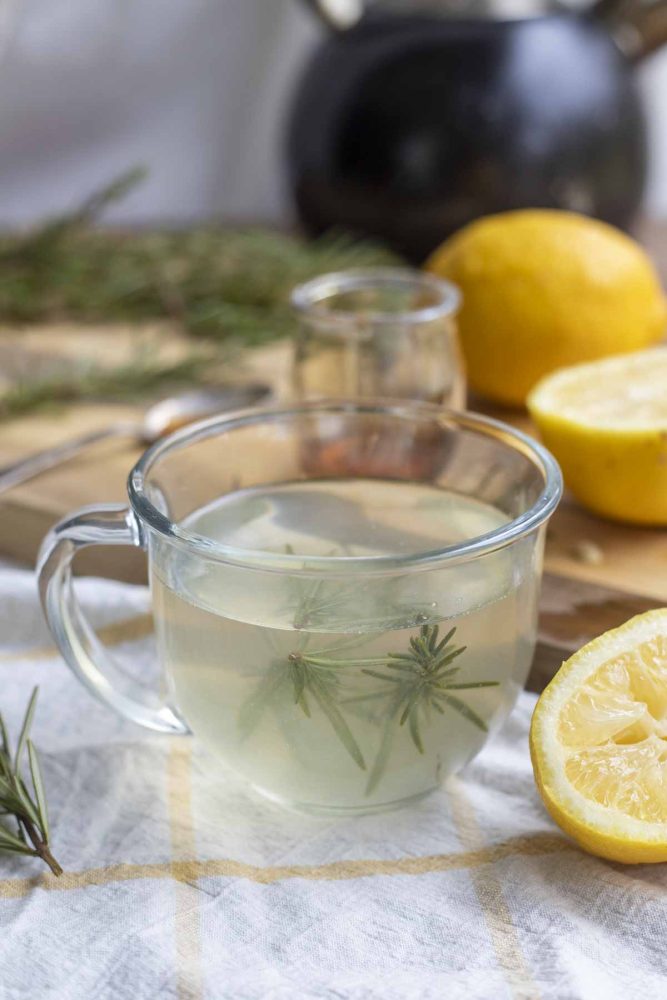
Recipe Highlights:
Calming: There is something just relaxing about drinking this warm tea. It can not only help you relax, but may even help you think more clearly.
Delicious rosemary flavor: This rosemary tea recipe is beaming with robust flavor. This aromatic herb makes one of my favorite teas.
Easy: All you need is two ingredients and a little bit of time.
The links in this post contain affiliate links and I will receive a small commission if you make a purchase after clicking on my link. See the full disclosure here.
Potential Health Benefits of Rosemary Tea
Always talk to your doctor about starting anything new and especially if you are pregnant, nursing, have any health issue, or are taking medication.
Anti-inflammatory properties: Rosemary contains anti-inflammatory compounds and antioxidants which may help increase blood circulation, boost the immune system, and reduce free radicals (source)
Positive effect on memory loss and cognitive function: Smelling the aroma of rosemary oil for 4-10 minutes improved concentration and performance (source). In another study on college students, taking oral Rosmarinus officinalis L. reduced anxiety and depressions, improved sleep quality and improved memory. (source)
Potent Antioxidants: Can help prevent/reverse oxidative damage.
Boost hair growth: This is more of the topical effect of rosemary oil or extract, but the bioactive compounds have shown to stimulate the hair follicles and help hair growth.
Antibacterial properties: Rosemary extracts have been shown to have antibacterial, antifungal, and insecticidal properties. You may find this extract as a natural preservative in foods.
Lower blood sugar levels: Rosemary tea contains carnosic acid and rosmarinic acid which have shown to have insulin-like effects on blood and lower blood sugar levels. The tea itself has not been studied for these effects, but these two components.
May help digestion: May help balance good bacteria in the gut, support a healthy digestive system, and reduce inflammation which can help with digestive issues.
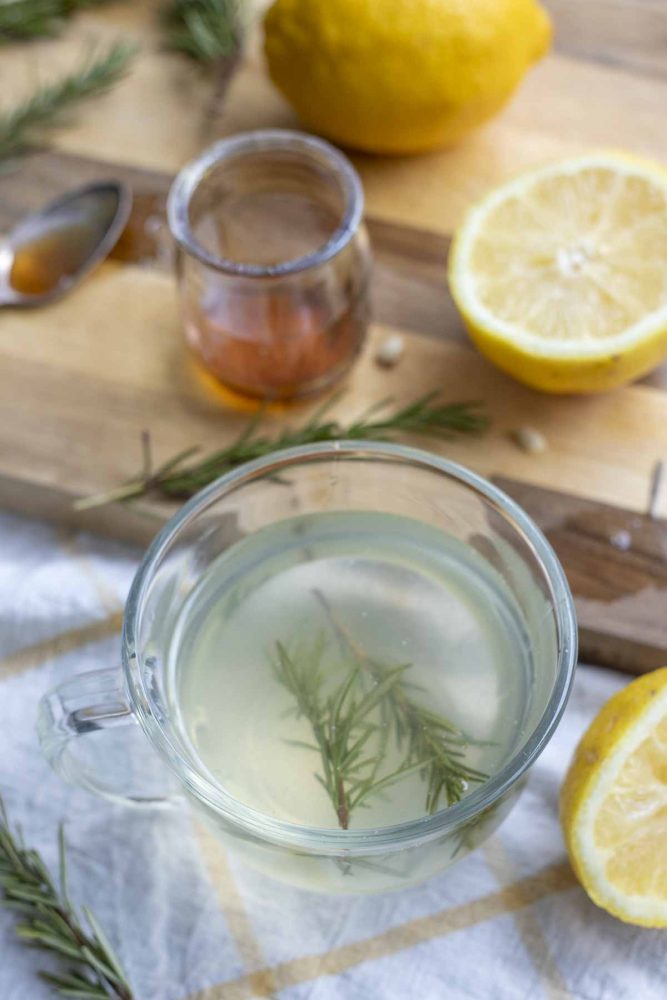
Tips:
- This tea can have a slightly overwhelming flavor, I highly recommend adding a few extras like ginger, honey or lemon to help add additional flavors.
- Although I use fresh rosemary leaves, dried leaves would also work. Substitute 1 tsp of dried rosemary for fresh rosemary.
- Can be made hot or cold. Enjoy as a refreshing cold brew tea in the warmer months.
- Brewed too much tea? Use the extra as a hair rinse. After washing and conditioning, pour the hair rinse off your hair and let it sit for a few minutes. Wash out if desired or leave in.

Ingredients:
Water: I like to use filtered water. But tap water will do.
Rosemary: Fresh or dried. I prefer fresh
Optional add-ins:
Add dried or fresh herbs during steeping. Things like lemon juice, honey, etc. Can be added after.
Sliced ginger
Fresh lemon juice
Cloves
Mint: Add a few fresh mint leaves for a more invigorating cup of tea.
Green tea: If you want to add more benefits and maybe some caffeine, add 1 bag of tea while steeping.
Honey or maple syrup: If you like to add a little sweetness, add a few drops of honey or maple syrup. This can also help with a sore throat.
Tools you may need:
Tea kettle or saucepan
Mug
Save This Recipe
Tea strainer or small fine mesh strainer (especially if you are using dried).
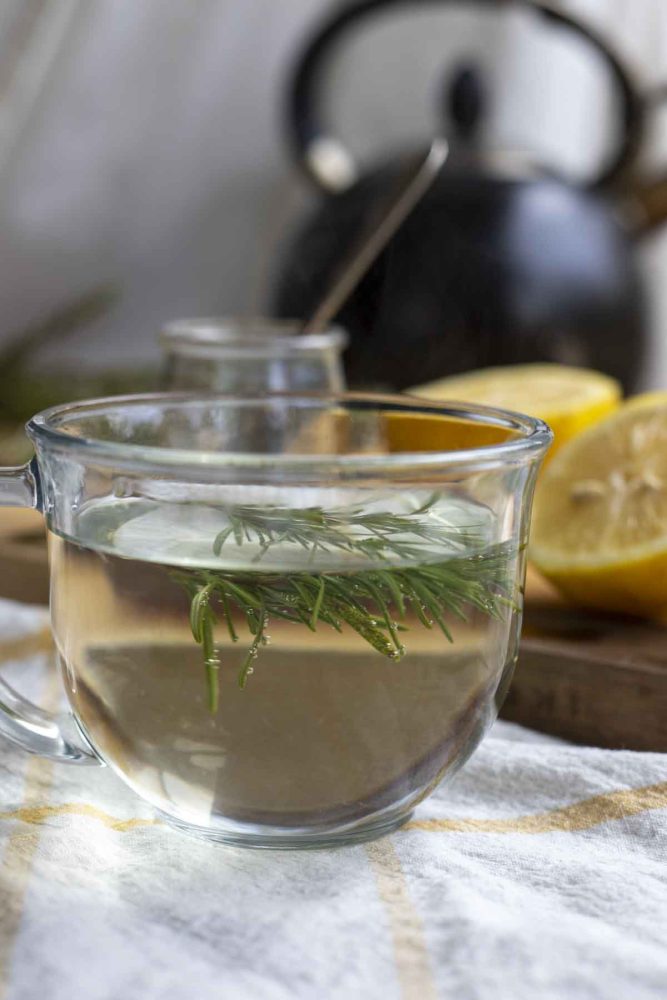
How To Make Rosemary Tea – Two Ways
Rinse rosemary and place in a small pot. I find this herb to have a lot of debris and in need of a good rinse before using.
Cover with water and place on high heat.
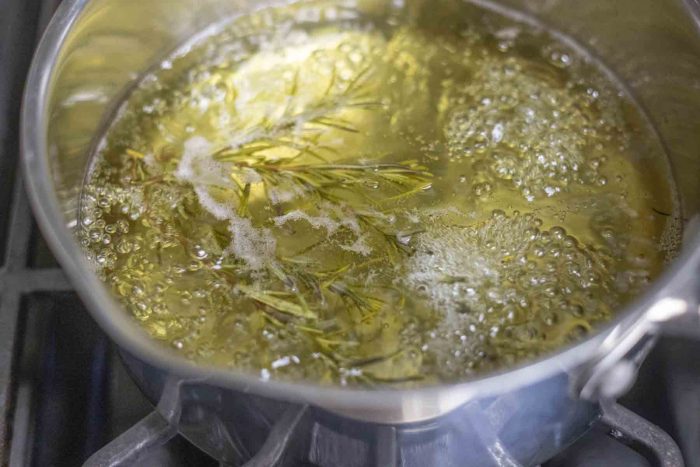
Bring it up to a boil and simmer for 2-3 minutes or more. Simmer for a longer amount of time for a stronger flavor.
Take off the heat and remove the sprigs. I like to do this with tongs or a slotted spoon.
Pour the herbal tea into a mug and add additional ingredients if desired.
Enjoy. This way yields a stronger rosemary flavor.
With A Tea Kettle
Add water to a tea kettle or saucepan and bring to a boil.
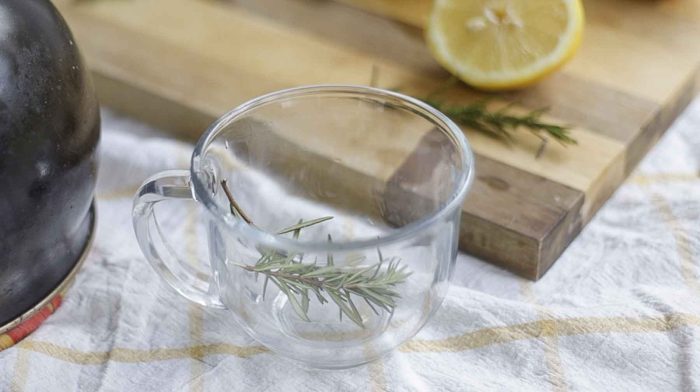
Place rinsed fresh rosemary sprigs into a mug.

Pour hot water into the mug and let it steep for 5-10 minutes.
Pull out the leaves, add any additional ingredients if desired.
Enjoy.
Rosemary Iced Tea
Prepare a double or triple batch of this homemade rosemary tea recipe. Add any other add-ins if desired.
Strain, add sweetener if desired, and allow to cool covered in the refrigerator.
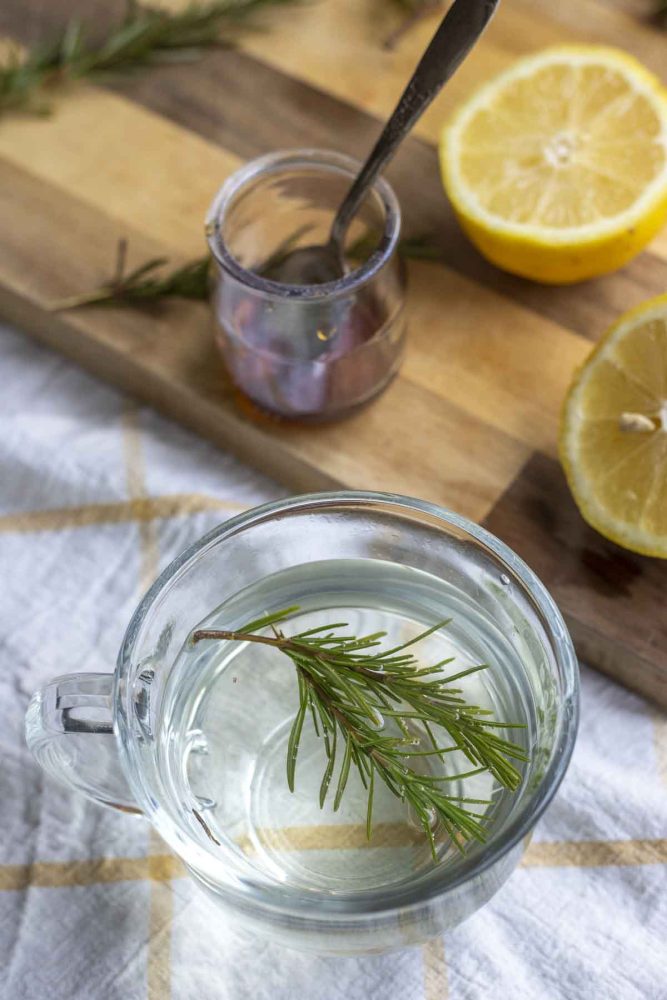
FAQ:
Can I boil rosemary and drink it?
Yes. Boiling rosemary with water to make tea.
What is the best way to make rosemary tea?
After trying it a few different ways, I have found that the best way is to use heat water in a tea kettle and steep fresh rosemary sprigs for 5-10 minutes. This gives a delicious and subtle flavor. For more potent flavor, simmer the sprigs in water for 2-3 minutes in a saucepan.
Can you drink rosemary tea from fresh rosemary?
Rosemary tea can be made from fresh or dried rosemary.
Can you drink rosemary tea everyday?
Yes. Rosemary tea can be part of your daily routine. Too much rosemary tea can cause some side effects, so drink in moderation.
What does rosemary tea taste like?
It is very robust and earthy with refreshing flavors of pine and pepper. This fragrant evergreen herb from the mediterranean region has distinctive and robust flavors.
Potential Side Effects:
Always talk to a healthcare provider before starting anything new. Especially pregnant women, if you are breastfeeding, taking any medications, or have a health condition.
Taking large amounts of rosemary can cause stomach issues, vomiting, spasms, etc. There have also been allergic reactions reported. (source)
Potential drug interactions: (source)
- ACE inhibitors
- Anticoagulants
- Diuretics
- Lithium
Rosemary tea is an easy to make and delicious beverage that has a multitude of health benefits. It can be brewed either with fresh sprigs or dried, both of which have become increasingly available in grocery stores.
Not only is it a refreshing and tasty choice for a hot beverage, but the many health benefits, including improved digestion, anti-inflammatory properties, and its ability to help reduce stress
Find More Delicious Drinks:
- Lavender Lemonade
- Vegan Pumpkin Spice Latte
- Healthy Pina Colada Smoothie
- Honey Butter Latte
- Tropical Oatmeal Smoothie
If you try this recipe and love it, I would love if you could come back, comment on the post, and give it 5 stars! Please and thank you.
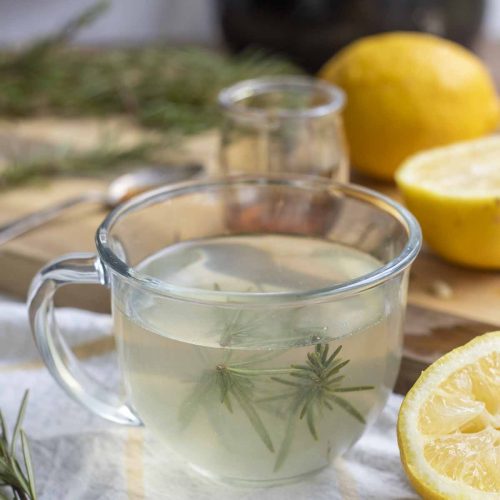
Rosemary Tea
Save This Recipe
Equipment
- Tea kettle optional
Ingredients
- 2-3 sprigs rosemary
- 1 cup water
Instructions
- Rinse rosemary and place in a small pot. I find this herb to have a lot of debris and in need of a good rinse before using.
- Cover with water and place on high heat.
- Bring it up to a boil and simmer for 2-3 minutes or more. Simmer for a longer amount of time for a stronger flavor.
- Take off the heat and remove the sprigs. I like to do this with tongs or a slotted spoon.
- Pour the herbal tea into a mug and add additional ingredients if desired.
Tea Kettle Method
- Add water to a tea kettle or saucepan and bring to a boil.
- Place rinsed fresh rosemary sprigs into a mug.
- Pour hot water into the mug and let it steep for 5-10 minutes.
- Pull out the leaves, add any additional ingredients if desired.
- Enjoy.
Notes
- This tea can have a slightly overwhelming flavor, I highly recommend using the tea kettle method for a lighter flavor. Also, adding a few extras like ginger, honey or lemon to help add additional flavors.
- Although I use fresh rosemary leaves, dried leaves would also work. Substitute 1 tsp of dried rosemary for fresh rosemary.
- Can be made hot or cold. Enjoy as a refreshing cold brew tea in the warmer months.


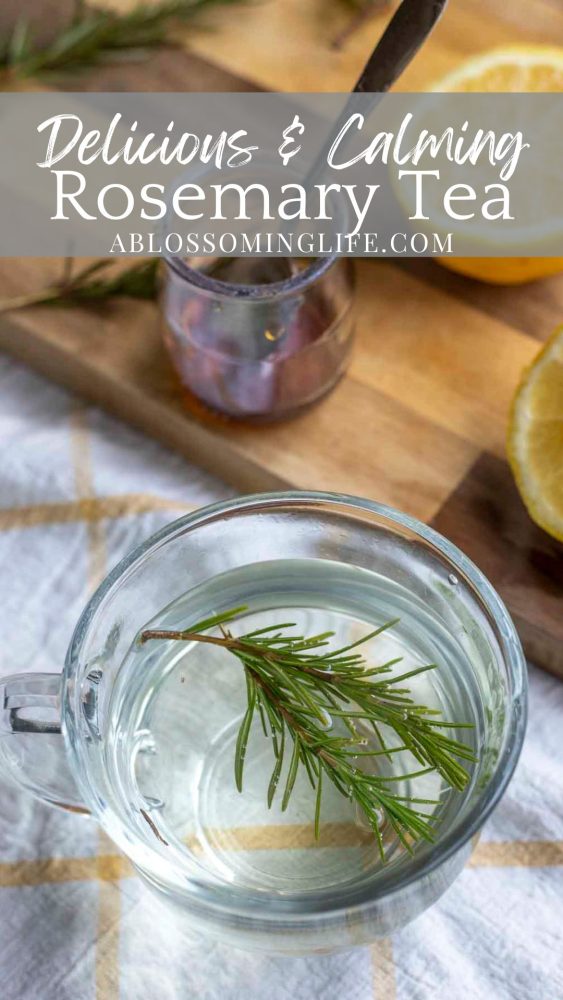
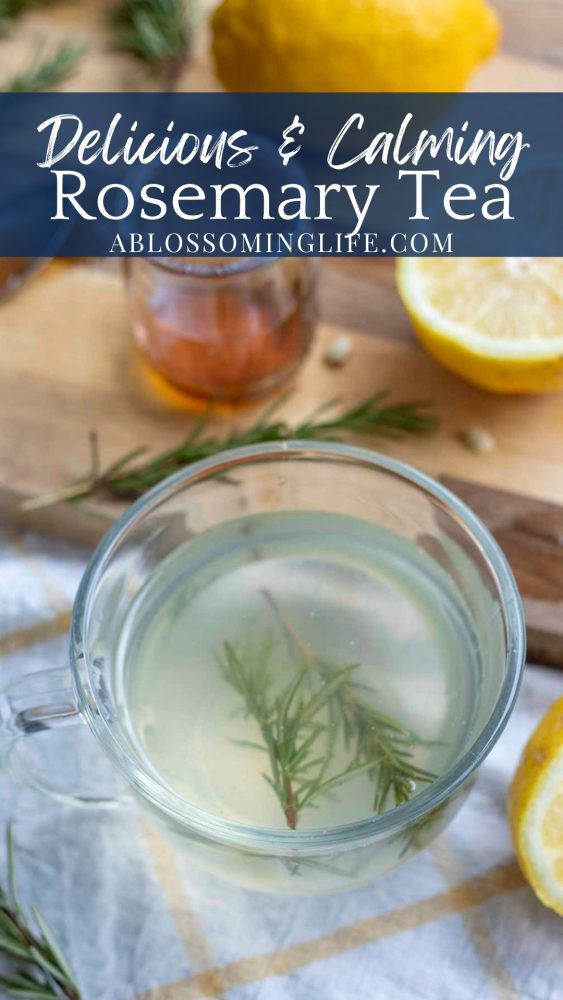
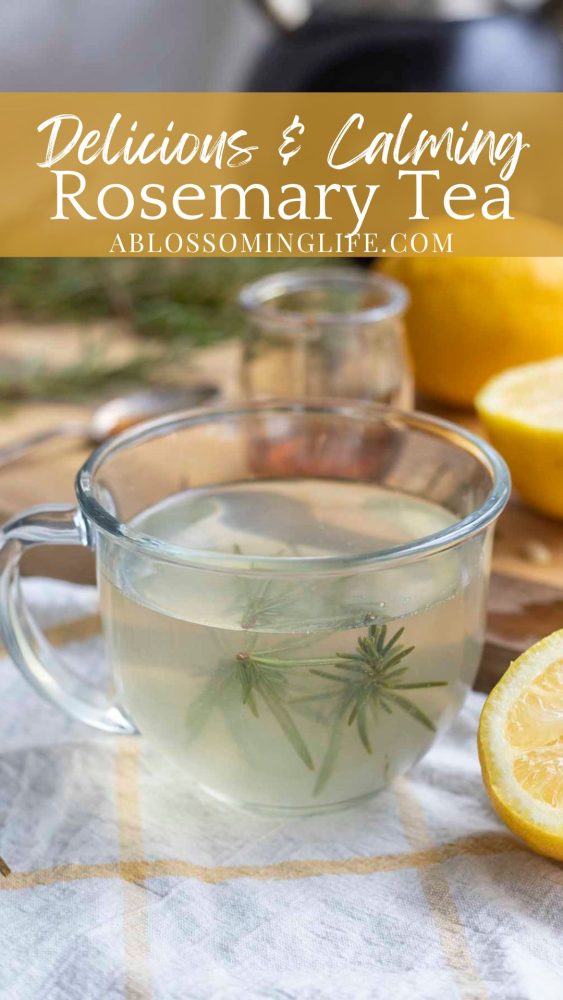
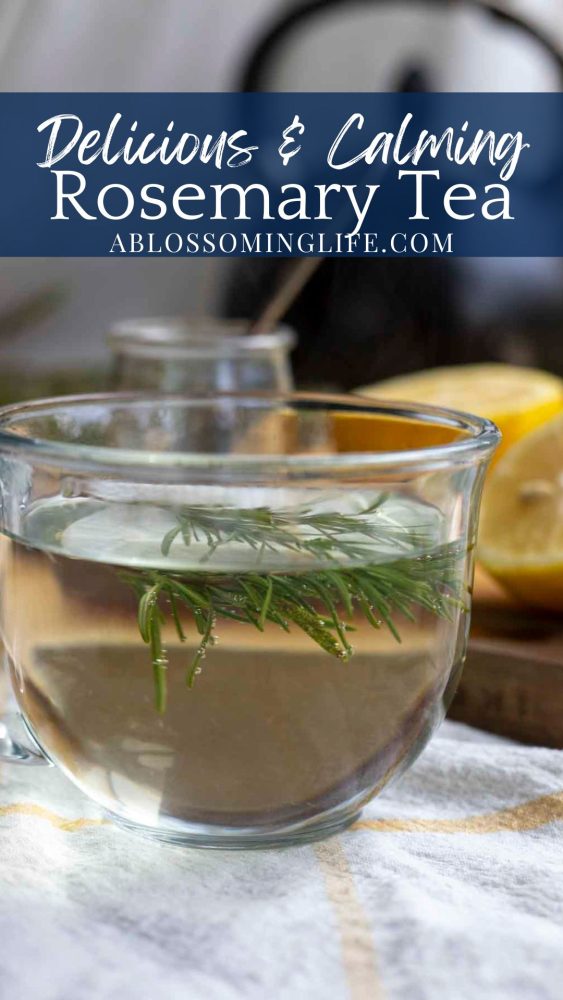



Amy is really good at recipe. She writes it in detail and I love that ❤️
I love this tea and the results are exactly as you say. The benefits are paying off. I also take a fresh pineapple rine, add Rosemary in a large pot of water. Bring to a boil then simmer 20 minutes. Strain, add honey. Hot or cold it’s so good and great health benefits!
That sounds delicious. Pineapple is great for coughs too.